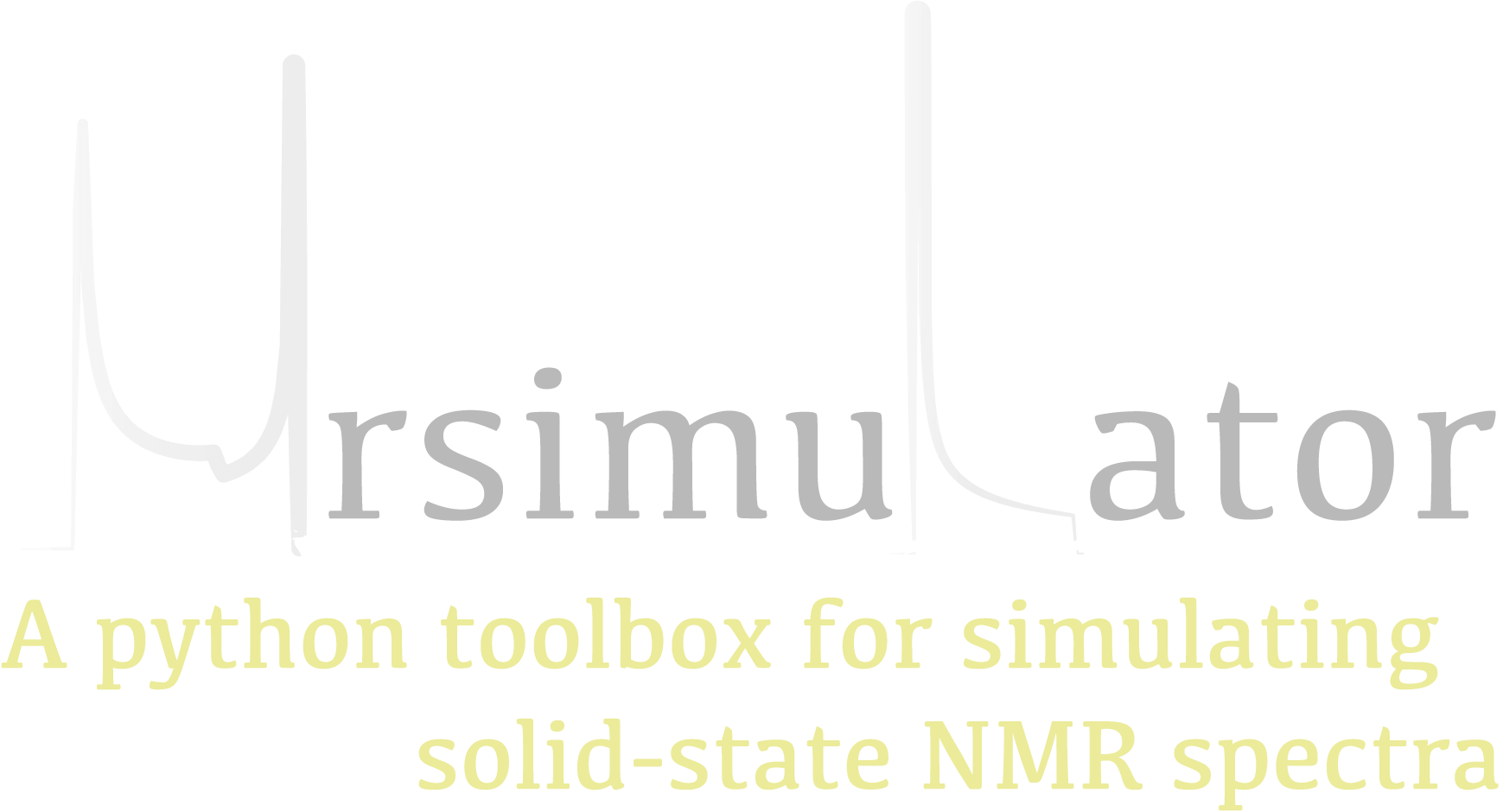Utility functions¶
- mrsimulator.utils.collection.single_site_system_generator(isotope: Union[str, List[str]], isotropic_chemical_shift: Union[float, List[float], ndarray] = 0, shielding_symmetric: Optional[Dict] = None, shielding_antisymmetric: Optional[Dict] = None, quadrupolar: Optional[Dict] = None, abundance: Optional[Union[float, List[float], ndarray]] = None, site_name: Optional[Union[str, List[str]]] = None, site_label: Optional[Union[str, List[str]]] = None, site_description: Optional[Union[str, List[str]]] = None, rtol: float = 0.001) List[SpinSystem]¶
Generate and return a list of single-site spin systems from the input parameters
- Parameters:
isotope – A required string or a list of site isotopes.
isotropic_chemical_shift – A float or a list/ndarray of isotropic chemical shifts per site per spin system. The default is 0.
shielding_symmetric – A shielding symmetric dict object, where the keyword value can either be a float or a list/ndarray of floats. The default value is None. The allowed keywords are
zeta,eta,alpha,beta, andgamma.shielding_antisymmetric – A shielding antisymmetric dict object, where the keyword value can either be a float or a list/ndarray of floats. The default value is None. The allowed keywords are
zeta,alpha, andbeta.quadrupolar – A quadrupolar dict object, where the keyword value can either be a float or a list/ndarray of floats. The default value is None. The allowed keywords are
Cq,eta,alpha,beta, andgamma.abundance – A float or a list/ndarray of floats describing the abundance of each spin system.
site_name – A string or a list of strings with site names per site per spin system. The default is None.
site_label – A string or a list of strings with site labels per site per spin system. The default is None.
site_description – A string or a list of strings with site descriptions per site per spin system. The default is None.
rtol – The relative tolerance used in determining the cutoff abundance, given as, \(\tt{abundance}_{\tt{cutoff}} = \tt{rtol} * \tt{max(abundance)}.\) The spin systems with abundance below this threshold are ignored.
- Returns:
List of SpinSystem objects with a single Site
Example
Single spin system:
>>> sys1 = single_site_system_generator( ... isotope=["1H"], ... isotropic_chemical_shift=10, ... site_name="Single Proton", ... ) >>> print(len(sys1)) 1
Multiple spin system:
>>> sys2 = single_site_system_generator( ... isotope="1H", ... isotropic_chemical_shift=[10] * 5, ... site_name="5 Protons", ... ) >>> print(len(sys2)) 5
Multiple spin system with dictionary arguments:
>>> Cq = [4.2e6] * 12 >>> sys3 = single_site_system_generator( ... isotope="17O", ... isotropic_chemical_shift=60.0, # in ppm, ... quadrupolar={"Cq": Cq, "eta": 0.5}, # Cq in Hz ... ) >>> print(len(sys3)) 12
Note
The parameter value can either be a float or a list/ndarray. If the parameter value is a float, the given value is assigned to the respective parameter in all the spin systems. If the parameter value is a list or ndarray, its ith value is assigned to the respective parameter of the ith spin system. When multiple parameter values are given as lists/ndarrays, the length of all the lists must be the same.
- mrsimulator.utils.collection.site_generator(isotope: Union[str, List[str]], isotropic_chemical_shift: Union[float, List[float], ndarray] = 0, shielding_symmetric: Optional[Dict] = None, shielding_antisymmetric: Optional[Dict] = None, quadrupolar: Optional[Dict] = None, name: Optional[Union[str, List[str]]] = None, label: Optional[Union[str, List[str]]] = None, description: Optional[Union[str, List[str]]] = None) List[Site]¶
Generate a list of Site objects from lists of site attributes.
- Parameters:
isotope – A required string or a list of site isotopes.
isotropic_chemical_shift – A float or a list/ndarray of isotropic chemical shifts per site. The default is 0.
shielding_symmetric – A shielding symmetric dict object, where the keyword value can either be a float or a list/ndarray of floats. The default value is None. The allowed keywords are
zeta,eta,alpha,beta, andgamma.shielding_antisymmetric – A shielding antisymmetric dict object, where the keyword value can either be a float or a list/ndarray of floats. The default value is None. The allowed keywords are
zeta,alpha, andbeta.quadrupolar – A quadrupolar dict object, where the keyword value can either be a float or a list/ndarray of floats. The default value is None. The allowed keywords are
Cq,eta,alpha,beta, andgamma.name – A string or a list of strings with site names per site. The default is None.
label – A string or a list of strings with site labels per site. The default is None.
description – A string or a list of strings with site descriptions per site. The default is None.
- Returns:
List of Site objects
- Return type:
sites
Example
Generating 10 hydrogen sites:
>>> sites1 = site_generator( ... isotope=["1H"] * 10, ... isotropic_chemical_shift=-15, ... name="10 Protons", ... ) >>> print(len(sites1)) 10
Generating 10 hydrogen sites with different shifts:
>>> shifts = np.arange(-10, 10, 2) >>> sites2 = site_generator( ... isotope=["1H"] * 10, ... isotropic_chemical_shift=shifts, ... name="10 Proton", ... ) >>> print(len(sites2)) 10
Generating multiple sites with dictionary arguments:
>>> Cq = [4.2e6] * 12 >>> sys3 = site_generator( ... isotope="17O", ... isotropic_chemical_shift=60.0, # in ppm, ... quadrupolar={"Cq": Cq, "eta": 0.5}, # Cq in Hz ... ) >>> print(len(sys3)) 12
- mrsimulator.utils.get_spectral_dimensions(csdm_object, units=False)¶
Extract the count, spectral_width, and reference_offset parameters, associated with the spectral dimensions of the method, from the CSDM dimension objects.
- Parameters:
csdm_object – A CSDM object holding the measurement dataset.
- Returns:
A list of dict objects, where each dict contains the count, spectral_width, and reference_offset.
